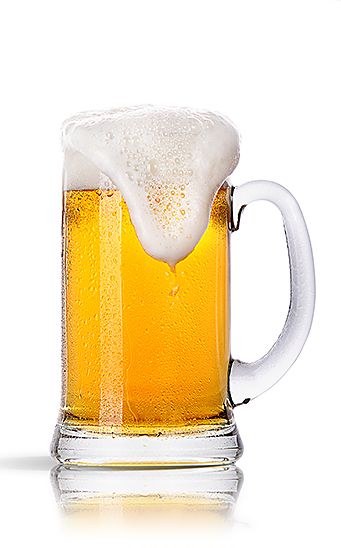
Beer
After 7,000 years of consumption, it is now that the great benefits of beer are being discovered. Its moderate consumption is related to improving cardiovascular health, delaying the onset of menopause and reducing the risk of suffering from megaloblastic anemia or spinal cord malformations.
According to the study “Evaluation of the nutritional, functional and sanitary properties of beer, and its comparison with soft drinks”, regular beer consumers drink more cereals, fruits, meat and fish than those who drink water or soft drinks as beer whets your appetite. For this reason, they have higher intakes of thiamine, riboflavin, niacin, pyridoxine, folates, vitamins C and D, calcium, iron, iodine, zinc, and magnesium. The research has been carried out by Doctors José Vicente Carbonell and José María Sendra, from the Institute of Agrochemistry and Food Technology (IATA) of the Higher Center for Scientific Research (CSIC).
The “maximum responsible” for these benefits is the raw material of this golden liquid: barley . However, despite the high content of vitamins, carbohydrates and other important elements for health, beer is not a complete food, so it is necessary to supplement the diet with foods that provide those substances that beer lacks .
Better than soft drinks
This study has shown that beer “being a natural product, it offers a greater diversity of ingredients than refreshing drinks , highlighting its contribution of B vitamins and some mineral substances”. Among the vitamins, riboflavin, pyridoxine, niacin and folic acid should be highlighted; and among the minerals, phosphorus and silicon.
Beer is a drink with a very low sodium content and, therefore, it becomes a very suitable element for low-sodium diets. Compared with water, it has a very similar sodium content and 16 times lower than that of milk. Likewise, this golden liquid provides an important daily dose of polyphenols, which are natural antioxidants that can reduce the oxidative phenomena that cause the body to age.
In addition, the famous “blonde” is a very safe drink from a sanitary point of view, since they use very simple and controllable raw materials such as water, barley, yeast and hops and, during its manufacturing process, any microorganism present.
Among its many benefits, beer provides a significant amount of soluble fiber that can complement other foods, such as cereals, which are very rich in insoluble dietary fiber.
Its moderate consumption is related to improving cardiovascular health, delaying the onset of menopause and reducing the risk of suffering from megaloblastic anemia or spinal cord malformations. In short, it quenches thirst, refreshes and has a reviving effect. It is not surprising that this “blonde” is on everyone’s lips.
Benefits of beer
In recent years, it has been proven by numerous scientific studies that moderate and responsible alcohol consumption can provide the body with multiple benefits, including a reduction of up to 60% in the risk of suffering coronary lesions. It must be borne in mind, however, that when a person consumes more than 60 grams of alcohol per day (that is, more than two liters of beer) they can have cirrhosis problems, heart attacks … So the intake Alcohol should always be done in a responsible way and without excesses.
The moderate consumption of beer, according to experts, increases the amount of good cholesterols that prevent the bad ones from acting on the blood vessels. Also, consumers of this popular drink have amounts of vitamin E (anti-cancer) infinitely higher than the rest.
In short, the dose of energy and nutrients is closer to that recommended, with a lower tendency to be overweight and obese than other groups and their blood parameters are more favorable. In addition, it has been proven that moderate alcohol consumption delays the onset of menopause in women by an average of two years, since the level of estrogens in the blood in beer-consuming women is higher than that of abstainers. It is also considered a dietary source of silicon, an element that actively participates in calcification processes.
Relaxing effect of beer
Beer not only quenches thirst and refreshes, but also decreases excitability and relaxes. Its great topic is that it makes you fat and that it can even lead to obesity. On the other hand, beer is a natural, diuretic, low-calorie, fat-free drink that, due to its carbonic acid content, helps with digestion. So the so- called “beer gut” is not the fault of the beer, but of what accompanies it.
However, despite all the benefits that beer brings, the Beer and Health Information Center wants to encourage, above all, the moderate and responsible consumption of beer. This “moderate consumption” amounts to two and a half bottles a day for women and three for men; Each of the bottles must be 200 centiliters and its intake is recommended during meals.




















+ There are no comments
Add yours